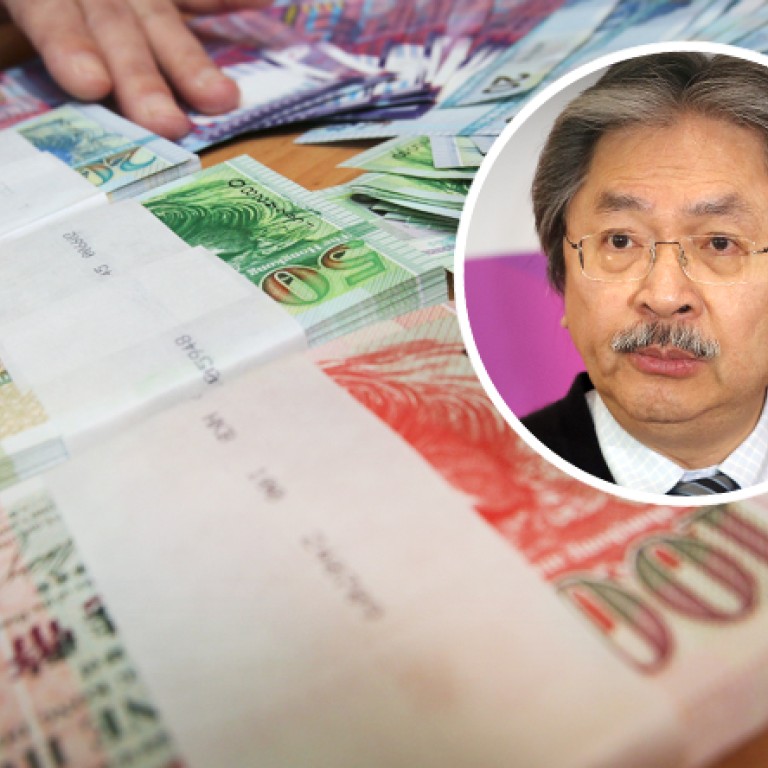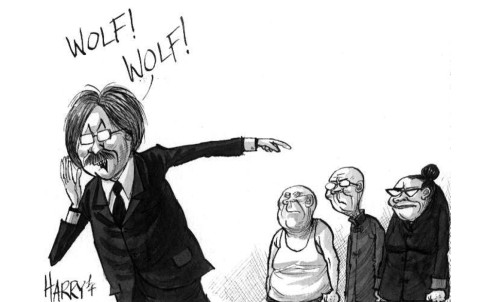
Cash reserves to dry up in 20 years, finance secretary to warn in budget
Budget speech to contain dire warning of fiscal meltdown due to ageing population, but critics say it's a 'doomsday scenario' and a scare tactic
The city's fiscal reserves of HK$734 billion will run dry in about 20 years if nothing is done to ease the financial problems caused by its ageing population.
That dire warning is expected to feature in Financial Secretary John Tsang Chun-wah's budget speech next month.
A government source said that unlike in the past, fiscal deficits were likely to persist and would worsen in the long term.
"The future structural deficit can only be postponed, but can hardly be reversed," the source said. "It's time to get ready for the discussion."
But critics called it a "doomsday scenario" and accused the government of scare tactics.
In the past few years, the government has balanced its books and generated surpluses of billions of dollars through land revenues and stamp duty from stock transactions. But Tsang's fiscal advisers have found the revenue might not be able to cover government expenditure in 10 years, it is claimed.
Without drastic measures, the deficit would persist and reserves would drop to zero around 2034, a second source said.
The source also said the advisers had projected other scenarios with even more extreme assumptions.
In his budget on February 26, Tsang will present the findings of a nine-member team of economists and other finance professionals, who were appointed by the government to identify financial challenges posed by the ageing population.
But Dr Brian Fong Chi-hang, vice-chairman of the SynergyNet think tank, accused the government of scare tactics. He said the reliability of the forecast would depend on fluctuations in factors including economic growth and the pace of ageing.
Apart from the fiscal reserves, the government could dip into an accumulated surplus of HK$642 billion if necessary, Fong said.
And he criticised the government for being dishonest by failing to be upfront with the public about the existence of the surplus.
"It is misleading for the working group's report to draw up such a doomsday scenario," he said. "The situation would be very different if the government implements effective measures to boost the birth rate."
The impending effects of the ageing population have called into question the government's long-term financial planning.
With the first "baby boomers", born in 1952, having retired in 2012, the workforce will start shrinking by 2018.
By 2041, only 1.8 people of working age - defined as between 15 and 64 - will support one dependent elderly person financially, down from a current ratio of 5.1.
This will put financial pressure on spending on health care and welfare, with tax revenues falling and economic growth slowing.
Government expenditure has risen 5.2 per cent per year since 1997, almost double the 2.8 per cent of annual growth in revenue and the city's gross domestic product, official statistics show.
With elderly numbers on the rise, the government has been injecting more funds into the Hospital Authority. The Old Age Living Allowance has also brought additional annual expenditure of HK$15.1 billion.
The Monetary Authority said the financial secretary could use part of the accumulated surplus with the approval of the chief executive, provided this did not undermine the ability of the Exchange Fund to preserve the city's monetary and financial stability.
The fiscal reserves and the accumulated surplus both belong to the Exchange Fund, which is managed by the authority and stood at HK$2.9 trillion as of November. The accumulated surplus is the total profit earned by the fund since 1935.
Former finance chief Antony Leung Kam-chung is understood to have drawn from the surplus after the 2003 outbreak of severe acute respiratory syndrome to make up for a huge deficit.
Another major component of the fund, a monetary base of HK$1.2 trillion that comprises currency in circulation and the balance of the banking system, is reserved exclusively for stabilising the Hong Kong dollar.
The HK$734 billion fiscal reserves account for 24 per cent of the Exchange Fund and yield investment returns of about HK$30 billion per year.
The Working Group on Long-Term Fiscal Planning submitted its report to Tsang on December 30. The group's full report is expected to be released after the February 26 budget speech.
It is understood the advisers have recommended measures that have been adopted overseas, including increasing revenue by reviewing the tax system, tightening expenses and mobilising the accumulated surplus.
A member of the group, Francis Lui Ting-ming, economics professor at the University of Science and Technology, warned of a problem 10 years from now. "From then on, the structural fiscal deficit could increase at a stunning pace," he said.
Last month, Tsang warned on his official blog that the government needed to raise revenues by raising taxes and issuing bonds.
He wrote: "These are recurrent expenditures, most of them being basic welfare, which can hardly be contained … One day we will have to deploy our reserves to maintain our public expenditure. And eventually, reserves will be used up."
The government consulted the public on introducing a goods and services tax in 2006, but the move was shelved in the face of strong opposition.


